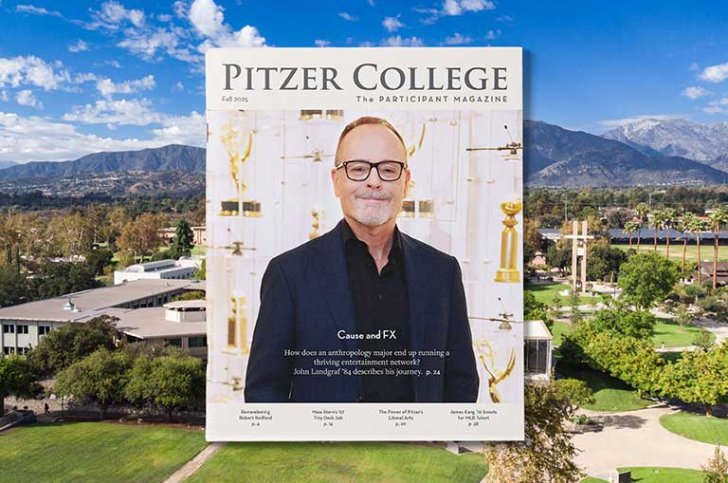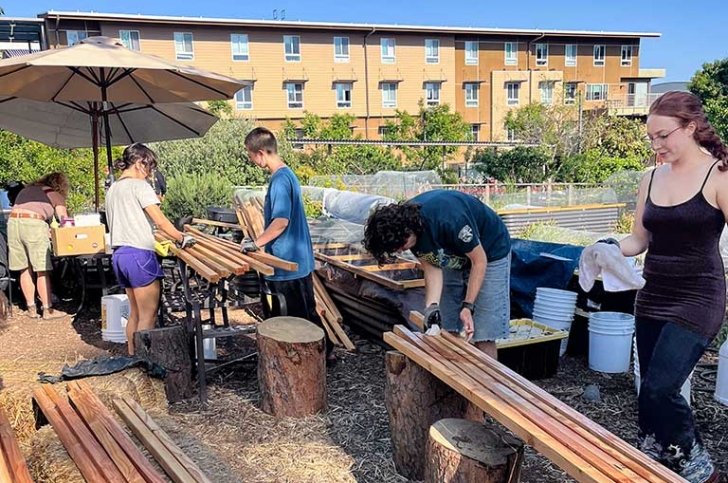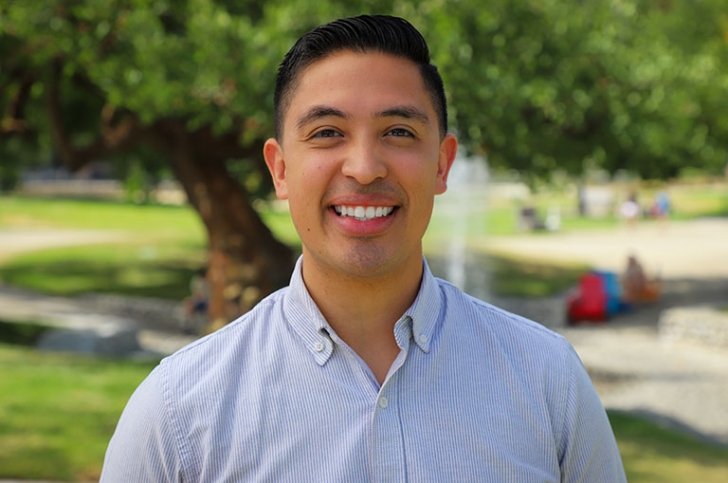Tools for Living
The liberal arts are important, right? The answer might seem obvious, but we asked our faculty to weigh in. Here are some of their reasons why, in their own words.
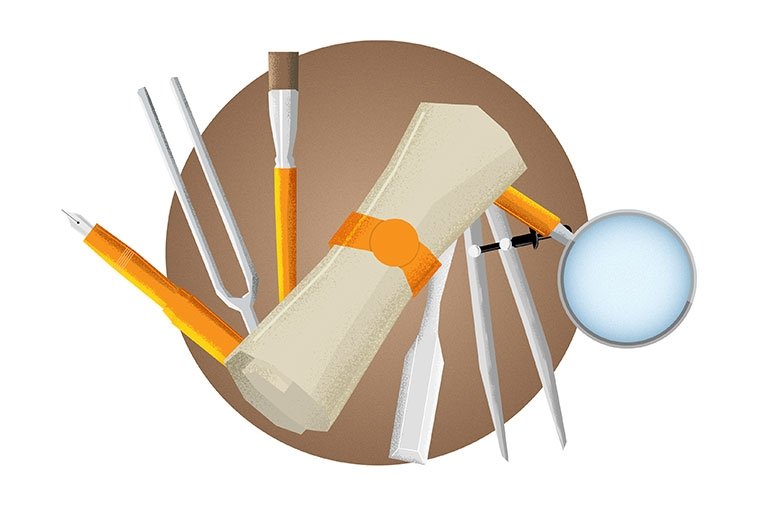
Seeing Different Points of View
Ruti Talmor, Professor of Media Studies
When I am asked to name a positive quality about myself, the first thing that comes to mind is, “I know how to think.”
I was a voracious reader of literature and a viewer of movies as a child. I was an art history major in college and a graduate student in cultural anthropology with a focus on visual culture. I have spent my life reading and looking and asking and trying to understand and then express knowledge that did not previously exist in my mind. Sometimes, when I am writing theoretically, I can feel my brain working, like a muscle. By the end of the day, it aches. There is a profound, exhausted satisfaction at the end of that kind of mental workout. I feel that a liberal arts education is one of the best ways to build your mind. Through repeated practice, you learn the skills and then exercise them again and again and again. It is an expansive practice. It makes the world bigger, exposes possibilities and wonders, and gives us agency and confidence and the power to decide.
"I feel that a liberal arts education is one of the best ways to build your mind. Through repeated practice, you learn the skills and then exercise them again and again and again. It is an expansive practice. It makes the world bigger, exposes possibilities and wonders, and gives us agency and confidence and the power to decide."
-Ruti Talmor, Professor of Media Studies
I became an anthropologist because I am deeply fascinated by the basic fact and ultimate mystery of our humanness and its creative diversity. Anthropology is always asking “Why? And why this way? And look, there are all these other ways. Why those? What do we all share, and how then are we so different?” These are the questions the liberal arts ask. They shift us out of our usual position. They move us to look upon the world from a new vantage point. This quickening, deepening, and opening of the mind, this practice of thinking, is the skill the liberal arts provide. We have always needed it. We certainly need it now.
More Than a Career
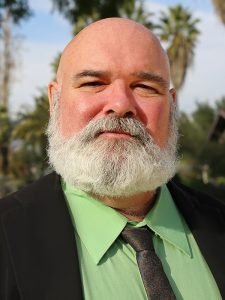
Brian L. Keeley, Professor of Philosophy
A liberal arts education is about the long run, not the immediate response to current conditions. When successful, a liberal arts education is for a lifetime, not just for the level of salary one gets upon graduation (assuming one doesn’t go on to additional education postgraduation). In my own case, when I consider what I learned 35 years ago when I earned a master’s degree in “knowledge-based systems”—essentially, artificial intelligence (AI)—the computer science skills I learned are no longer all that useful. Does anybody write programs in POP-11, PL/1, or Forth anymore?
What I do continue to make use of, however, are the liberal arts elements of that degree program, including the philosophical issues we tackled about the value of developing models that reflected what we knew of the brain, and the history of the ups and downs of AI. Those aspects taught me how to read critically, write clearly, and think more effectively—skills that I try to impart to my students today.
"[A liberal arts education] is meant to equip one for a life, not just a career."
-Brian Keeley, Professor of Philosophy
I am also reminded of the first- and second-year writing program I taught in as a graduate student in philosophy and cognitive science. This program was a two-year-long Western “great books” program where the undergraduate students (who were often pre-med or hoping to pursue careers in science and technology) were guided through the history of Western thought. We started with the Old Testament and the Ancient Greeks, working our way up to the early 20th century, reading primary texts in philosophy, history, theater, literature, politics, etc. It was a solid liberal arts education with difficult texts, challenging ideas, and lots of writing. This program had been in place 40 years by the time I taught in it, and the university had good longitudinal data on what the former students thought of their experience.
What the program’s administrators saw was a consistent arc: Students disliked the courses while taking them. They hated them even more in their junior and senior years (as they bemoaned the time “wasted” on this distraction instead of learning more of the skills that they were struggling to learn in their scientific and technical majors). But then, after graduation, their appreciation for the program steadily tracked upwards, to the point that 20 to 30 years out of school, they insisted that their donations to the university should support the program. Why? Because after many years out in the “real world,” more and more, what they remembered of their college education was the material in those classes. They found themselves coming back to the books, the ideas, and the questions they grappled with in those classes. That is the power of a liberal arts education. It is meant to equip one for a life, not just a career.
The Power of Freethinking
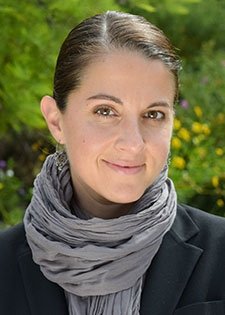
Michelle Berenfeld, John A. McCarthy Professor of Classics
The liberal arts are tools for living. In a time when information is both widely available and often unreliable, the liberal arts help us evaluate arguments, recognize rhetorical and visual moves, and grapple with perspectives that are not our own. A liberal arts education cultivates our ability to understand the difference between an assertion and a reasoned argument built on evidence. The humanities, in particular, offer opportunities to explore worlds outside of our own—past, present, or invented—and therefore develop new ways of thinking and imagine different futures. Exploring other perspectives is not only crucial because it helps us develop empathy and an open mind (although that is important), but also because relying on one’s personal experience, ideas, and feelings is not sufficient to function in society. We all need to read and think with others in order to gain the kind of knowledge and ways of thinking that allow us to do substantive things in the world. The liberal arts help us challenge our own perspectives and think about where our ideas come from so that we may seriously examine and adjust them throughout our lives.
"A liberal arts education helps us develop the tools we need throughout our lives to better understand the people and the world around us."
-Michelle Berenfeld, John A. McCarthy Professor of Classics
The simple fact that autocrats and dictators routinely go after them—taking books off library shelves, telling teachers what to talk about in class, censoring scholarly speech—is evidence of the power of the liberal arts. Dictators know, and so should we, that the arts, humanities, and social sciences are how we gain access to the minds and memories of those who came before us and who share the world with us now. With the tools of a liberal arts education—thinking critically, evaluating arguments, articulating our own ideas so that others can understand them—we are less vulnerable to those who say, “it was always like that” or “this is just how it is” or “how people are.”
More personally, the liberal arts offer limitless opportunities to find joy and learn throughout one’s life. They lay the foundation for a rich inner life in which we are able to explore the world through ideas and appreciate its beauty and complexity. They sustain us long after our formal education has ended by allowing us to be alone with our thoughts, to cultivate our attention to both work and leisure, and develop a generosity of spirit toward others. Perhaps most important, a liberal arts education helps us develop the tools we need throughout our lives to express our thoughts and ideas to others, to share our feelings, and to better understand the people and the world around us.
Unending Possibilities
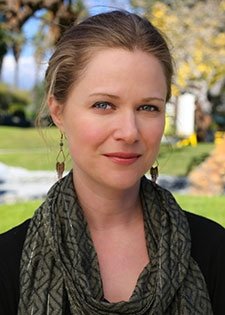
Harmony O’Rourke, Professor of History
One of many hopes I have for all Pitzer students is to question the social norms of the time and place in which they live. If something is described as “common sense,” there should be a quick pivot to questions such as, “Is this really the case?,” “How did it come to be?,” and “Are there other ways?” I begin my response in this way because there has indeed been a decline in liberal arts degrees since the great recession. However, the conventional wisdom that they matter less is misguided.
Students may feel pressured to major in a preprofessional field, believing this will enhance their chances of finding meaningful employment. But this is not borne out by the facts. The University of Colorado-Boulder concluded an exhaustive study of three decades of alumni up through 2018 and found that while those in STEM fields did earn more, arts and humanities alumni earned greater incomes than their counterparts with preprofessional or professional degrees (and also slightly more than those with social science degrees) by the time they reached their 50s.
"When you major in the liberal arts, you acquire the capacity to simultaneously grapple with complex and incomplete evidence, traces of lives lived, and rigorous theories of knowledge that help you see connections you couldn't see before."
-Harmony O'Rourke, Professor of History
I hope this information is an entrée to those curious about the unending possibilities of the human experience—the foundational focus of humanities disciplines. There is no end to learning what humans have thought, created, shared, borrowed, argued over, and destroyed. When you major in the liberal arts, you acquire the capacity to simultaneously grapple with complex and incomplete evidence, traces of lives lived, and rigorous theories of knowledge that help you see connections you couldn’t see before. Then you learn to work through it all by writing, discussing, and finding your own unique human voice. These are the exciting, hard-earned skills of critical thinking, open-mindedness, communication, creativity, and adaptability that the world needs.
Several years ago, a student wrote this simple note about what she learned that day in my class: “People are more than their oppression.” We are living in hard, bewildering times, but our ancestors have shown us how to see the constructs around us and to possess the confidence to commit ourselves to human and nonhuman flourishing. If this isn’t empowering, I am not sure what is.
Initiation Into a Larger World
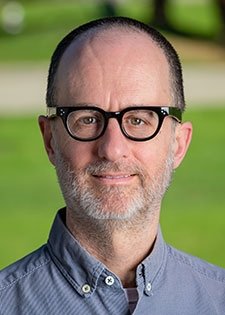
Bill Anthes, Professor of Art
Growing up I was always interested in the arts. I spent my time drawing and playing music, so when I started college, I assumed I would major in art. But I was excited by classes in art history, film, literature, philosophy, and religious studies. Courses in these fields introduced me to thinking critically about complex subjects. My teachers were broadly curious. Beyond their defined fields of study, they were engaged with social and political theory. What they studied and taught mattered outside of the classroom. Their teaching and mentorship shaped the person I would become, not just as a professor, but in how I thought about the world and my place in it, and how I related to other people and the planet.
"The humanities cultivated in me a hunger for new information and perspectives, for being surprised and thrown off-center."
-Bill Anthes, Professor of Art
The humanities introduced me to radical cultural, temporal, and spatial difference, and encouraged me to grapple with ambiguity, disagreement, and incommensurability—with not having all the answers and being OK with that. The humanities cultivated in me a hunger for new information and perspectives, for being surprised and thrown off-center. And as I get older, it’s important to hang onto that curiosity, that feeling of learning something new, of not being an expert. In my teaching, that feeling still motivates me. I tend to be a little restless intellectually. I revise my courses all the time, bringing in new material, new topics, new (to me) ways of thinking and being. There’s always something to learn, to be changed by. That’s a gift that my undergraduate teachers—and the humanities—gave to me, and I aspire to pass that along to the students I work with, whether they are in art, art history, or American studies (the majors I advise), or are in STEM, environmental analysis, or in the social and behavioral sciences that have always been a focus at Pitzer. Students don’t have to major in a humanities field to get that gift.
The News That Makes Life Worth Living

Brent Armendinger, Professor of English & World Literature/Creative Writing
Whether I’m writing or reading a poem, I’m practicing encountering something I don’t immediately understand with patience, attention, and a belief that it has something to teach me. This is something I try to model for my students in every one of my classes. The liberal arts help us cultivate ethical relationships with ideas, people, places, and more-than-human species that are unfamiliar to us. We come to understand what our individual lives have to do with the lives of others, both the living and the dead. I can think of nothing more important for our collective survival in these existential times of climate crisis, genocide, extreme economic inequality, rising fascism, and war.
"The liberal arts help us cultivate ethical relationships with ideas, people, places, and more-than-human species that are unfamiliar to us."
-Brent Armendinger, Professor of English & World Literature/Creative Writing
William Carlos Williams famously wrote, “It is difficult / to get the news from poems / yet men die miserably every day / for lack / of what is found there.” To me, Williams is talking about a kind of news that lives beneath the surface of all the noise that vies for our attention. It’s the kind of news that allows us to approach the crucial issues of our time (and of others’ times) from the light (and sound and breath) of lived experience. It’s the kind of news that demands something more of us than simply consuming information, and, if we let it, it touches us on a deeper level. Sometimes, it’s the kind of news that requires us to change our lives, to take concrete action for the world we want to live in.
What else should we be doing with our lives?
How to Adapt and Think Critically
Carina Johnson, Peter and Gloria Gold Professor of History
As a historian, an invitation to reflect on the value of a liberal arts education always inspires me to turn to history—a historical perspective helps us think critically about the politics that motivate efforts to dismiss the liberal arts as irrelevant in the 21st century.
The term “liberal arts” has long been a term to describe “free (liberal) inquiry or thought” in western Eurasia. Historically, in Europe, the study of the “seven liberal arts” became widespread with the emergence of the university, when students began their college studies with the trivium: first learning grammar, logic (critical analysis), and rhetoric (effective and persuasive communication) and then moving on to the natural world with the quadrivium: the four fields of arithmetic, geometry, music (physical harmonics), and astronomy.
Finally, with a developed capacity for critical thinking, analysis, and communication, students embarked on their professional studies in medicine, law, theology, and the natural sciences (called in earlier times natural philosophy). These practices of critical thought, these studies, brought about the fields of knowledge we now define as a liberal arts education: the natural sciences, the social sciences, the humanities, and the arts. Studying the liberal arts develops a broad, cross-field, and cross-discipline capacity to think, do, and act—the abilities to observe, to analyze, to communicate, and to engage in effective and ethical practice have brought about the world we live in today. We are human. We make human choices, as individuals and societies. The skills that help us make informed choices, to recognize community across difference, to flex with profound change, are the liberal arts.
"We are human. We make human choices, as individuals and societies. The skills that help us make informed choices, to recognize community across difference, to flex with profound change, are the liberal arts."
-Carina Johnson, Peter and Gloria Gold Professor of History
So why do naysayers, and especially naysayers posing as genuine critics in the past dozen years, want us to dismiss the liberal arts as an impediment to real-world learning and careers? The question of “value” was raised by the Obama administration, which in 2015 offered a measure of the financial outcomes of an undergraduate education at the five-year mark with the College Scorecard. There were good reasons for this effort (more historical context!), yet five years after graduation is a very short time span. Longitudinal studies continue to demonstrate that, over longer time spans, liberal arts majors are better than preprofessional majors at adapting to a rapidly changing work environment. So why aren’t people absorbing that message?
The liberal arts are a set of necessary skills that cannot be copied but have to be taught, again and again, to each person. It is no accident that generative AI models have been taught to “think” or extrude patterns with the writings of many, many communicators educated and skilled in the practice of free inquiry, in the liberal arts. Why do naysayers have no interest in creating new generations of critical thinkers who can move from judging the reliability of information to effective communication and ethical action? In 2025, some of the answers to that question are more visible than ever.
The Power of the Liberal Arts
Watch a video of our students and faculty describing the liberal arts experience at Pitzer:
News Information
Published
Organization
- Communications
